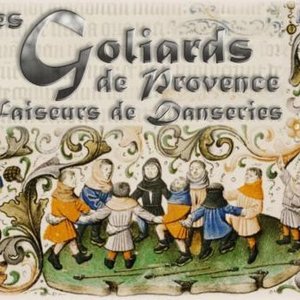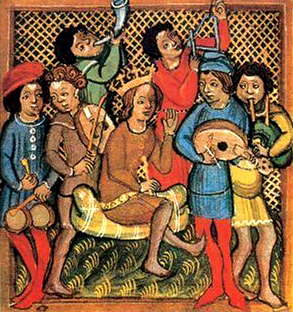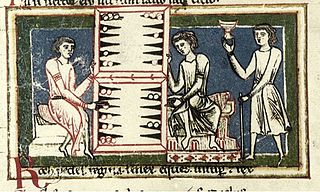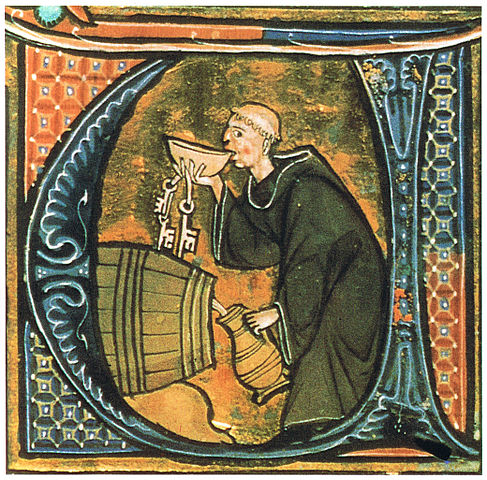Boiling in my spirit's veins
With fierce indignation,
From my bitterness of soul
Springs self-revelation:
Framed am I of flimsy stuff,
Fit for levitation,
Like a thin leaf which the wind
Scatters from its station.While it is the wise man's part
With deliberation
On a rock to base his heart's
Permanent foundation,
With a running river I
Find my just equation,
Which beneath the self-same sky
Hath no habitation.
Carried am I like a ship
Left without a sailor,
Like a bird that through the air
Flies where tempests hale her;
Chains and fetters hold me not,
Naught avails a jailer;
Still I find my fellows out
Toper, gamester, railer.*
To my mind all gravity
Is a grave subjection;
Sweeter far than honey are
Jokes and free affection.
All that Venus bids me do,
Do I with erection,
For she ne'er in heart of man
Dwelt with dull dejection.
Down the broad road do I run,
As the way of youth is;
Snare myself in sin, and ne'er
Think where faith and truth is;
Eager far for pleasure more
Than soul's health, the sooth is,
For this flesh of mine I care,
Seek not ruth where ruth is.**
Prelate, most discreet of priests,
Grant me absolution!
Dear's the death whereof I die,
Sweet my dissolution;
For my heart is wounded by
Beauty's soft suffusion;
All the girls I come not nigh,
Mine are in illusion.
'Tis most arduous to make
Nature's self surrender;
Seeing girls, to blush and be
Purity's defender!
We young men our longings ne'er
Shall to stern law render,
Or preserve our fancies from
Bodies smooth and tender.
Who, when into fire he falls,
Keeps himself from burning?
Who within Pavia's walls
Fame of chaste is earning?
Venus with her finger calls
Youths at every turning,
Snares them with her eyes, and thralls
With her amorous yearning.
If you brought Hippolitus
To Pavia Sunday,
He'd not be Hippolitus
On the following Monday;
Venus there keeps holiday
Every day as one day;
'Mid these towers in no tower dwells
Venus Verecunda.***
In the second place I own
To the vice of gaming:
Cold indeed outside I seem,
Yet my soul is flaming:
But when once the dice-box hath
Stripped me to my shaming,
Make I songs and verses fit
For the world's acclaiming.
In the third place, 1 will speak
Of the tavern's pleasure;
For I never found nor find
There the least displeasure;
Nor shall find it till I greet
Angels without measure,
Singing requiems for the souls
In eternal leisure.
In the public-house to die
Is my resolution;
Let wine to my lips be nigh
At life's dissolution:
That will make the angels cry,
With glad elocution,
"Grant this toper, God on high,
Grace and absolution!"
*railer = someone who curses
**ruth= grief, sorrow
***Vebus Verecunda = modest Venus |
Nature gives to every man
Some gift serviceable;
Write I never could nor can
Hungry at the table;
Fasting, any stripling to
Vanquish me is able;
Hunger, thirst, I liken to
Death that ends the fable.
Nature gives to every man
Gifts as she is willing;
I compose my verses when
Good wine I am swilling,
Wine the best for jolly guest
Jolly hosts are filling;
From such wine rare fancies fine
Flow like dews distilling.
Such my verse is wont to be
As the wine I swallow;
No ripe thoughts enliven me
While my stomach's hollow;
Hungry wits on hungry lips
Like a shadow follow,
But when once I'm in my cups,
I can beat Apollo.
Never to my spirit yet
Flew poetic vision
Until first my belly bad
Plentiful provision;
Let but Bacchus in the brain
Take a strong position,
Then comes Phoebus flowing in
With a fine precision.
There are poets, worthy men,
Shrink from public places,
And in lurking-hole or den
Hide their pallid faces;
There they study, sweat, and woo
Pallas and the Graces,
But bring nothing forth to view
Worth the girls' embraces.
Fasting, thirsting, toil the bards,
Swift years flying o'er them;
Shun the strife of open life,
Tumults of the forum;
They, to sing some deathless thing,
Lest the world ignore them,
Die the death, expend their breath,
Drowned in dull decorum.
Lo! my frailties I've betrayed,
Shown you every token,
Told you what your servitors
Have against me spoken;
But of those men each and all
Leave their sins unspoken,
Though they play, enjoy to-day,
Scorn their pledges broken.
Now within the audience-room
Of this blessed prelate,
Sent to hunt out vice, and from
Hearts of men expel it;
Let him rise, nor spare the bard,
Cast at him a pellet:
He whose heart knows not crime's smart,
Show my sin and tell it!
I have uttered openly
All I knew that shamed me,
And have spued the poison forth**
That so long defamed me;
Of my old ways I repent,
New life hath reclaimed me;
God beholds the heart-'twas man
Viewed the face and blamed me.
Goodness now hath won my love,
I am wroth with vices;
Made a new man in my mind,
Lo, my soul arises!
Like a babe new milk I drink-
Milk for me suffices,
Lest my heart should longer be
Filled with vain devices.
Thou Elect of fair Cologne,***
Listen to my pleading!
Spurn not thou the penitent;
See, his heart is bleeding!
Give me penance! what is due
For my faults exceeding
I will bear with willing cheer,
All thy precepts heeding.
Lo, the lion, king of beasts,
Spares the meek and lowly;
Toward submissive creatures he
Tames his anger wholly.
Do the like, ye powers of earth,
Temporal and holy!
Bitterness is more than's right
When 'tis bitter solely.
*ichor = blood of the gods
**spued = spewed
***Rainald of Dassel |





